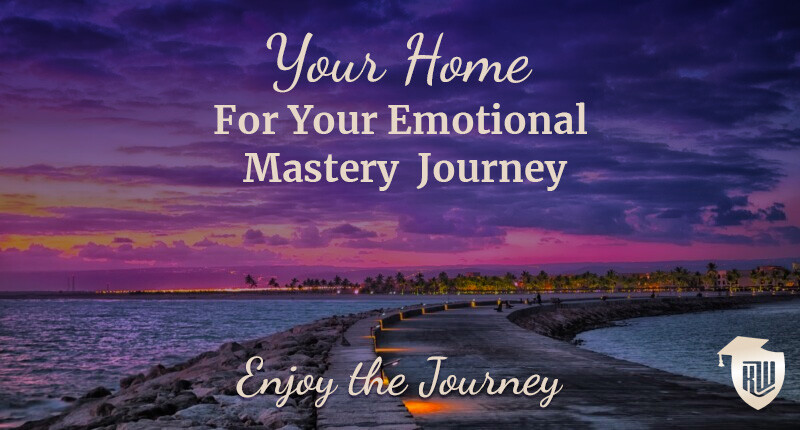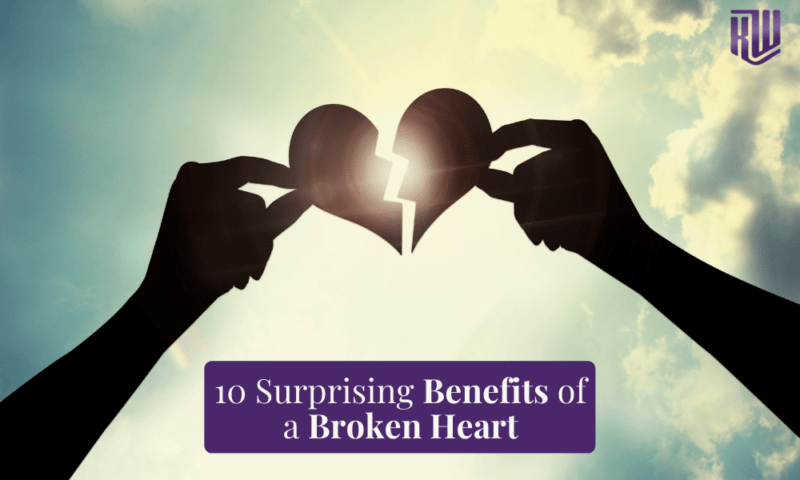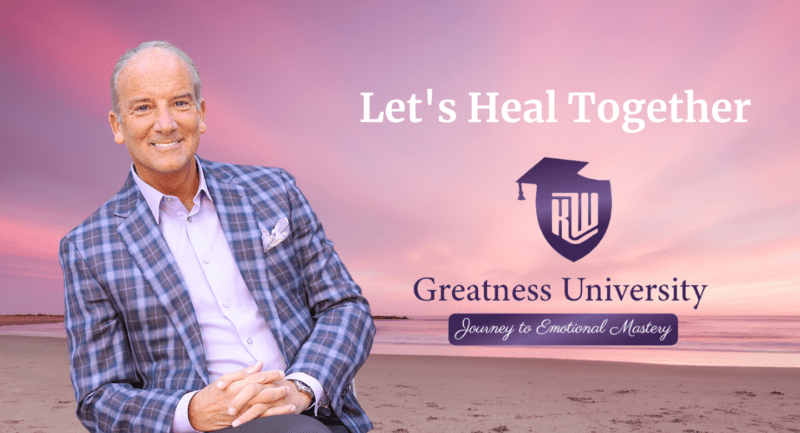Hello and welcome back! Today I’m talking about the ten surprising ways we benefit from a broken heart.
Now, 3 of these are incredibly empowering
They propel us forward and allow us to find the love and healing we deserve. The last 7 are the ones most people use. There’s benefit in them, but they are disempowering and self-sabotaging.
Unfortunately, most of society uses these.
- For many people, it spurs them to seek help. When we seek help, we gain more profound self-awareness. It’s hard to know every aspect of ourselves and having an outside reference helps.
- Here are some examples from clients of mine: a woman named Autumn came to me after many break-ups with narcissists. She suffered from anxiety, codependence, abuse.
- She was unaware but learned in this process that her anxiety was borne in childhood. Anxiety is caused by previous trauma that’s never been healed.
- Maybe you’re watching TV, and you get heart palpitations – it doesn’t make sense. You’re just relaxed watching TV. That’s your body sending you a signal that you have pain you’ve never dealt with.
- Autumn learned about the effects of childhood and where anxiety comes from through my online University classes.
- The longest she had gone without an anxiety attack in 40 years was four days. Now it’s been only one in a year. She’s elevated in her career now, developing a wonderful relationship with someone who is pursuing growth.
- Dave came to me because his marriage was falling apart. Dave was unaware of verbal abuse – he had no idea his wife was extremely verbally abusive.
If someone tells you what you should think, feel, or do (especially in a demeaning way):
- That’s abuse. Many times there are also belittling aspects. Dave’s wife would condemn and criticize him all the time – he was completely unaware that this was abusive, and so was his wife.
- When he became aware, and I helped him gain the tools, the two of them could reconnect and save the marriage.
- Gerardo came to me because his marriage was falling apart – he knew nothing about narcissism. He joined my university program and didn’t show up the first three weeks – he was scared.
- Gerardo wasn’t aware he couldn’t advocate for himself because of narcissistic influences in his childhood. He didn’t know he was repeating the abuse and could stand up for himself.
- Once he began coming to the classes, He realized he couldn’t work with a narcissist – it’s impossible.
- He filed for divorce and was able to protect his son. By learning tools and skills and not being codependent. he can raise his son differently.
- His son won’t be conditioned and fall prey to the same type of woman. He can do things as a father to protect his son from taking on those personality traits.
We learn more about what we do and don’t want.
- When we’re younger, most relationships we have when we’re younger teach us this: we get in them based on superficial things, and when we break up.
- we see what we don’t like. None of us have mapped out our morals, values, needs, wants, negotiable’s, and non-negotiable’s.
- Before we go on one date, we need to map this out – but no one had taught us! We end up in relationships with conflicting values because we got wrapped up in the dynamic of attraction.
- Georgie came to me not realizing that she could not express her needs and wants because of her childhood. She’d complain her partner wouldn’t do this or that.
- She exclaimed that her partner “should know” what she needs and wants. No, they shouldn’t. It’s our job to communicate our needs and wants.
- Even if we tell them once, we need to say it o them every day because it is our need.
- Another client would get frustrated when her husband would not ask her how her day was every day – what’s foremost in her mind is different than his.
It’s always our responsibility to continually ask for our needs and wants.
- It’s not their job to read our minds. As we gain maturity and Emotional Authenticity and ask for our needs and wants, the relationship will blossom.
- Manny came for something similar: he’d grown up in an abusive childhood with selfish addicts. He became an addict and struggled.
- He didn’t know how to communicate his needs and wants. It created a considerable relationship problem with his daughter.
- When Manny learned to become vulnerable, share his needs and wants, talk about his past, and share how he wants to be a good father: he saved his relationship with his daughter.
- Jay came to me because he was dating a woman who wouldn’t commit – they lived together, but she wouldn’t take the next step and marry him.
- As we talked about it, I realized Jay didn’t know his needs and wants because of his childhood – he had to take care of his parents.
- I told him to start saying “no” for the next week – even if it’s something he likes. He came in the next week talking about how he went to dinner with his girlfriend.
- His steak was undercooked, and he told the waiter it didn’t work for him and asked for it to be redone. His girlfriend was shocked, almost angry.
- She wondered what he was doing and why. He said it didn’t meet his needs and wants. She looked appalled, like she couldn’t figure him out.
Three weeks later,
- I’m scrolling through Facebook and see Jay proposing to his girlfriend. She said yes. When he stood up for his needs and wants, he became safe, powerful, and sexy.
- A woman doesn’t need a man who’s a bully and a tyrant but a man with purpose and boundaries.
- We realize all of this started in our childhood, and we do the work to heal the wounds. It’s our wounds from childhood that has us picking people that break our hearts.
- Science proves it. I discuss it in my book, summarized by the worst day cycle. If your heart keeps breaking, you’re repeating the pain from your childhood .
- it has nothing to do with the other person. This brings me to Michelle: I urge you to watch the YouTube video on 23 Minutes to Forgiveness.
- Michelle was married to an alcoholic, took care of the kids, cleaning the house, all of it. He was totally irresponsible. She had tried everything.
- But she couldn’t forgive him. I helped her see she had never forgiven herself for taking care of her mother, and she had never forgiven her mother.
- She was self-sabotaging by always being the dutiful little girl – she was picking people to relive that. She couldn’t forgive him because she couldn’t forgive herself.
This is true for everyone.
- I urge you to watch that video. I met Amy at a networking event, and she eventually got in touch with me because she and her recent husband were separating.
- Amy didn’t realize that it all tied to her father and a simple exchange with him as a child. I won’t repeat it, but it was something he said to her that left her with tremendous guilt and shame.
- She had to put up this wall and shut off her vulnerability. Her inability to open her heart was playing a massive role in the struggles in her marriage.
- She learned about it and was able to turn things around. Finally, Kelly’s story is one of the most heartbreaking experiences I’ve had as a coach – it shows that the most successful people have the most trauma.
- When she walked into the office, struggling with several addictions, could not cook or clean, she was utterly incapable of taking care of herself.
- Her mom was an executive at a huge Fortune 500 company and did incredible things, yet she made her daughter a prisoner by spoiling her. Kelly was in her late 20s and never had a job –
Mom was paying for everything.
- Even worse, Kelly could have a huge bar bill, and mom would pay the bill, yet if Kelly did anything loving for herself like self-care, mom would threaten to pull the funding.
- Think about that. Because of her pain, her mother had created a child molded into an alcoholic, just like mom. We think spoiling is good.
- But it’s severely abusive – it’s “the best” for the parent. Parents use their children this way. Kelly didn’t know this – she was utterly unaware her mother made her a prisoner.
- I’ve never seen a client work so hard and transform her life.She is now self-sufficient and has a job.She regained control of her life and her identity. She’d rescued herself.
Here are the seven disempowering “benefits” that most people use from a broken heart.
To be clear, most are completely unaware that they are doing these things. These processes most often happen detached from conscious awareness, and even if pointed out to the person, they will deny this is what they are doing:
- They seek attention! What happens when we tell our friends or post on social media about our break-up? We get 300 people saying, “oh, you poor thing,” “You are so great, he/she is such a jerk.”
- That’s a significant benefit – we were obviously in a bad relationship, and now we get the attention that was lacking in the relationship.
- Here’s where it’s disempowering: we try to get others to fix it for us. The second someone offers a real solution; we won’t do it. Do you see why we won’t fix it?
- If we go and fix the problem, we lose all of that attention.
- We love when others want to fix it for us. Therefore, unconsciously we repeated the pattern and chose to relive it.
- By choosing not to become an expert in healing ourselves, we are choosing disempowerment and disempowered benefits. This ties directly into…
Power.
- Total power. When we don’t take ownership of our choices and don’t do the work to heal, we get control over other people by getting other people to shower us with care and concern.
- This gives us an added benefit. We don’t have to take responsibility.
- If I stay stuck, I don’t have to get real help because my friends care more about fixing my problem than I do.
- Staying stuck, playing the victim, and letting others take responsibility for the issue gives a person tremendous power.
- We never have to be vulnerable. If we don’t do the work, we don’t have to be vulnerable. We get to stay in self-deception, claiming we want a relationship.
- But our actions make it impossible. So again, unconsciously we are benefitting by not doing the work to know why we picked this person.
We never have to know ourselves.
- If we don’t know ourselves, we can never be in a real relationship which protects me from being vulnerable with another person.
- What a benefit. All the people I mentioned above who did the work opened themselves up and saved themselves by being vulnerable.
- Freedom. Doing all this gives us freedom. If I’m not vulnerable, it guarantees my relationship will end. It gives me freedom. If my friends take responsibility instead of me, I am free to do as I please.
- The big one: all of these keep us stuck as the adapted wounded child. I talk about this in detail in my book Your Journey To Success. To survive our parent’s imperfect parenting.
we all adapt victim tendencies to create a connection with our parents as a survival mechanism.
- As adults, we won’t get help, learn, and heal wounds from our childhood for fear of losing the adapted false survival connection we developed with our parents.
- Most are so out of touch with reality and the truth of their childhood that they don’t even think this has anything to do with the parenting they experienced.
- As science proves, 95% of our adult lives we are stuck in our subconscious (childhood experiences), making choices and decisions based on what we experienced as a child.
- The pain in our adult lives is a direct reflection of the pain we experienced in childhood. There is a direct and irrefutable connection.
- We are all living as the adapted, wounded child. To find the love we deserve, as a society, we must own this and bring this truth to the masses.
Why do we all do this? We are only 50 years into the deep exploration of psychology and talking about these dynamics as a society.
Owe are fitting against centuries of a culture that refuses to deal with childhood and be open about their feelings and pain.
Pain is growth.
The avoidance of pain creates more pain. The only way to liberate pain is to become an expert in it. I gave you nine examples of people who went head-first into the pain and changed their lives. The solution is in our pain and darkness.
Society has always told us we aren’t allowed to be negative – that’s no way to live.
The only way we can indeed be positive is to become an expert in pain and stop the seven disempowering benefits.
In America, we want to be kind and friendly. But the model we’ve been shown, which includes the seven disempowering benefits, is codependent and not love. It’s not kindness.
It’s abusive and keeps us stuck as the victim. It robs us of greatness and potential, making sure we continue to suffer a broken heart.
Here’s the thing:
- If you recognize this in yourself, stop.
- Stop posting and telling people about it – hire a professional.
- If you aren’t ready for that yet, read books, watch videos, learn your needs and wants, and heal your wounds.
If you find yourself trapped with a friend or loved one who won’t address the seven disempowering benefits: the most loving thing you can do is stop listening.
Tell them you now recognize if you continue to sit and listen to them, you enable them and are part of the problem.
I urge us to stop the seven disempowering benefits and move into the three empowering methods to find the love we all crave and deserve.
Enjoy The Journey!

Are you feeling stuck?
Is your life just not working out the way you hoped?
You’ve come to the right place.
The Greatness University is a safe space for you to get back on track. Achieve your dreams by offering online masterclasses that provide you with the knowledge, skills, and tools to become the greatest version of yourself!
Through developing Emotional Authenticity, you will accept your perfect imperfections and attain self-love! Break the chains of fear, put an end to people-pleasing,
Say no with ease! Break free from toxic relationships by learning to set and negotiate healthy boundaries and create the lasting love and connection you deserve.
You deserve to be happy and have a life where you feel safe enough to show up as your authentic self.
And we know that it takes courage – but we also know that it’s worth every single step on this journey.
You deserve a life free from toxic people, pain, and frustration. It doesn’t matter if you’re just starting out or have already walked a long way down this path .
our courses will help you take the next step in your journey to the greatest version of yourself. Join us today!





 The Greatness University
The Greatness University 